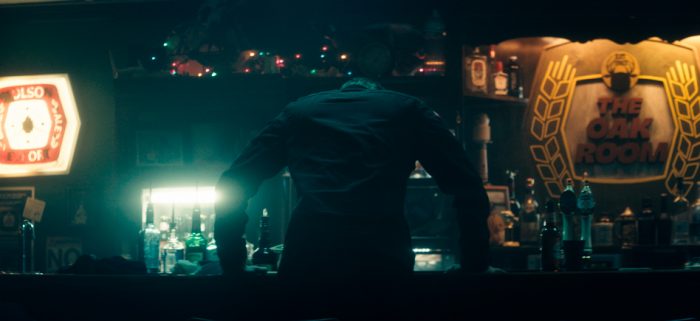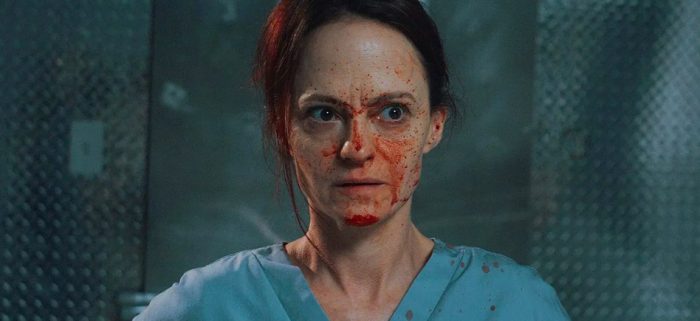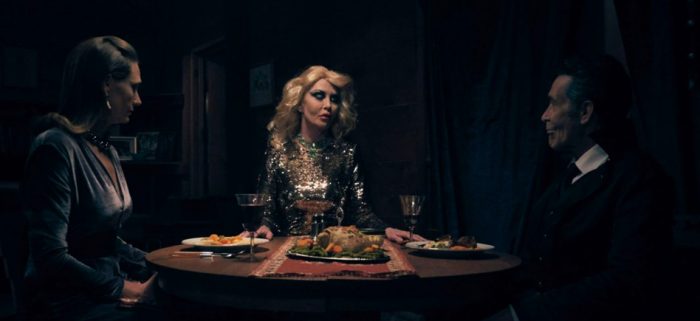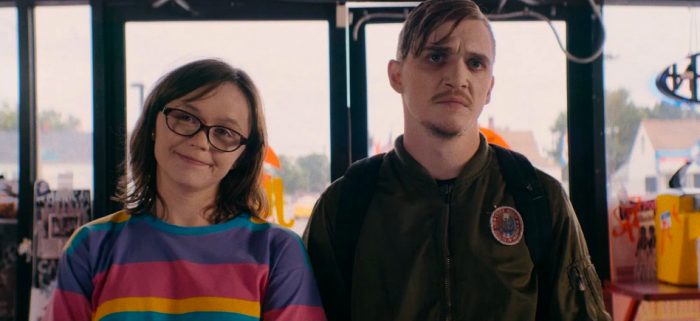Fantasia Film Festival Dispatches: 'The Oak Room', '12 Hour Shift', 'Climate Of The Hunter', 'Class Action Park', 'Dinner In America'
Usually, the genre-heavy Fantasia International Film Festival is held annually in Montreal, but with things the way they are this year (terrible), the festival has gone virtual. This year, Chris Evangelista and Matt Donato are covering Fantasia for /Film, firing off dispatches featuring capsule reviews of the titles we've watched from the safety of our own homes, all while dreaming of poutine.
In this edition: a documentary about a deadly theme park, a horror-comedy about organ harvesting, an unconventional vampire tale, and more.
The Oak Room Pulls Up A Chair and Pours A Tall Glass Of Narrative Suspense
A nameless Canadian town. A drifter walks into a bar after hours. An old debt needs settling. Cody Calahan's The Oak Room is about the power behind a proper story, and how the storyteller's narrative command can change everything.RJ Mitte plays Steve, a college dropout who returns home for a drink, and Peter Outerbridge plays Paul, the man pouring that drink. Paul and Steve have unfinished business, as the bartender's gruff and standoffish demeanor depicts. Steve offers a story as compensation, which is met with a scoff, but Paul allows his patron to chew his ear until backup arrives.What transpires is a shift in dynamics as Paul listens to what Steve has to say, and fables intertwine with reality. What starts as an anecdote ends in violence and betrayal. It's like something you might find in Fargo, as snowfall ushers in cold isolation that sets the stage for something sinister and criminal. It's a lot of talk, but there's intrigue as Paul "gooses the truth" while Steve's story becomes more and more haunting with each conspicuously familiar detail. A lesson in how structure, buildups, and key reveals are weapons in the right hands (er, mouth). – 7 out of 10 – Matt Donato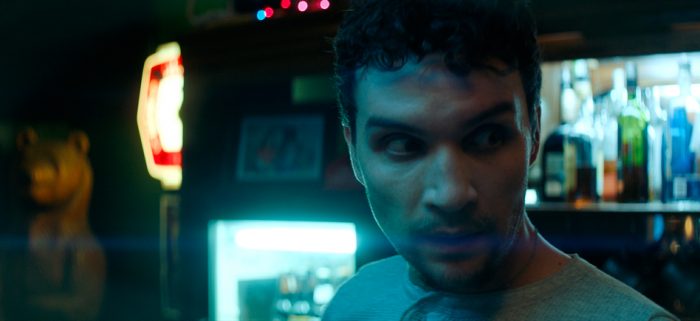
The Oak Room: Alternate Take
Was The Oak Room's screenplay written entirely with the CAPS LOCK on? It sure seems that way, as everyone in this film is dialed up to 11. People don't deliver their lines – they scream them; they shout them; they spit them. After a while, you badly want to urge everyone on screen to locate the nearest bottle of chill pills and down a few.
As The Oak Room started, I perked up. Visually, this film can be quite stunning – lit in dark, moody bar lights contrasting with cold, harsh snow, and all of it coupled with a melancholy score. But the minute characters opened their mouths, my heart sank. Steve (Breaking Bad alumn RJ Mitte) shows up in the basement bar owned by Paul (Peter Outerbridge), and things immediately go south. Steve seems happy to be reuniting with Paul, but Paul has nothing but bile for Steve, and spends approximately 20 minutes yelling at him while we're forced to watch. There's bad blood between the two guys, mostly involving money.
In an attempt to smooth things over, Steve starts telling a story, which gives way to another story, and so on. Storytelling is a big part of The Oak Room, and that would be all well and fine if the stories being told were the least bit interesting. But they're not. Instead, every character is harsh, rough-edged, and so confrontational that spending time with them is grating. Director Cody Calahan has a real flair for strong visuals, but Peter Genoway's script is so abrasive that it robs the film of its energy. Pity. 5 out of 10 - Chris Evangelista
Class Action Park is a Darkly Funny Documentary About Pain
In the late '70s through the 1980s and into the early 1990s, Action Park operated in Vernon, New Jersey – and became a death trap. The park was essentially run by teenagers and owned and operated by a shady figure named Eugene Mulvihill, who wanted nothing more than to create an amusement park where everything was on the table. Rules didn't apply. Rides were designed by people who really had no idea how to design rides. And as a result, people – most of them young – were constantly being injured. Things got so bad that multiple people ended up dying in the park (the official number is six).
In the documentary Class Action Park, using archival footage, crudely animated recreations, and interviews with people who worked at or attended the park (including comedian Chris Gethard), directors Chris Charles Scott and Seth Porges take us back to the park and delve into all the horrors that occurred. It's all presented with a darkly comedic air, with a few dips into the serious (mostly when talking about those who died). As far as documentaries go, Class Action Park breaks no new ground. In fact, it's often amateurish at times (the archival footage is so grainy and degraded you can barely make out what's happening, and the animated sequences are poor). And yet, the subject matter is so captivating that the doc becomes highly watchable, although don't be surprised if you're cringing or yelling at loud at some of the things that are covered here.
As morbidly entertaining as the documentary is, it kind of goes off the rails (just like one of Action Park's attractions) as it concludes, with the filmmakers suddenly attempting a sort of redemptive arc for Mulvihill, even though he clearly does not deserve it, and obviously did not give a shit about any of the deaths or injuries his park caused. 6 out of 10 - Chris Evangelista
12 Hour Shift Is A Zany Comedy Of Errors And Murder And Misplaced Organs
Brea Grant's 12 Hour Shift is a murderous comedy of errors that nails rural humor in a small-town microcosm. It's a film hinged on the stupidity of characters who, either unknowingly or foolishly, find themselves amidst black market organ dealings during a hospital's overnight hours. Kidneys are lost, misplaced, extracted, then lost again, but somehow the dunderheaded criminal antics don't wear thin. Their spontaneity is quite enjoyable.Angela Bettis plays nurse Mandy, who's stuck in the middle of everyone else's problems. Chloe Farnworth shines as Mandy's brainless hand-off contact and relative, Regina, who loses kingpin Nicholas' (Mick Foley) goods in transit. Regina knows she'll be used for parts if she can't locate the missing organs, so she returns to the hospital, and that's where things get even battier. Patients start dying, thugs roam the halls, and a convicted killer, played by David Arquette, escapes from his room.Mandy is having a no good, awful time.12 Hour Shift never takes itself seriously enough to make the calamity that ensues anything more than "dumb fun," and I mean that positively. There's a whole lot of character incompetence, from cops who are too busy flirting to realize they're aiding a crime, to Regina's constant ability to make matters worse (and bloodier). It's the kind of narrative where "WTF" moments depend on air-headed actions that only become more cringe-worthy as scenes pass, but it all works in this mindset. It's a B-movie about haplessness, illegalities, and bumbling thrills that'll get you through just fine. - 7 out of 10 - Matt Donato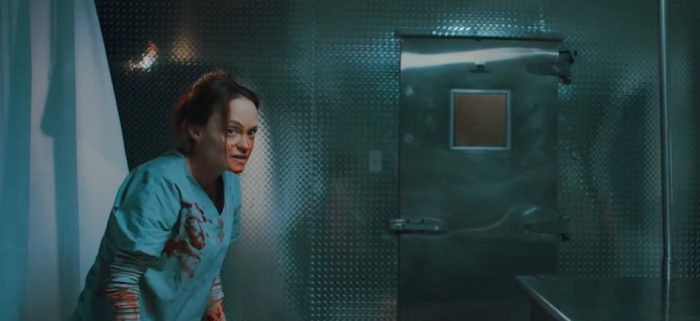
12 Hour Shift: Alternate Take
Horror and comedy are two of the most subjective genres in the film world, so anyone who attempts to blend them into a horror-comedy is asking for trouble. Every now and then, the results can be successful (see: Shaun of the Dead, An American Werewolf in London, Abbott and Costello Meet Frankenstein). But more often than not, the film in question leans way too far into the comedy and completely neglects the horror elements, resulting in something shrill and clumsy.
Such is the case with 12 Hour Shift, a nasty piece of work from writer-director Brea Grant. Angela Bettis (who really deserves better) is Mandy, a nurse with a sketchy background who happens to be running an organ harvesting business on the side. She procures organs from the hospital she works at and passes them along to her "cousin" Regina (Chloe Farnworth). When an organ swap goes wrong, Regina and Mandy's lives are in danger from their buyer, played by a game Mick Foley.
Now, Mandy has to get her hands on a new organ. Who will it be from? A kindly old man? A body in the morgue? A murderer (David Arquette) recently brought into the hospital? The stage is set for all sorts of misadventures, and sure enough, Grant's film leans into them, heavily, resulting in a film populated by repulsively stupid characters who keep making dumb decisions. The film's premise has tons of potential, but you won't find any of that here. 4 out of 10 - Chris Evangelista
Climate of the Hunter Is A Soulless Chamber Piece That Talks Your Ear Off
Filmmaker Mickey Reece describes his style as "people talking in rooms," and yup, that's Climate of the Hunter. A conversational vampire conundrum that so desperately wants to recreate the coolness of Only Lovers Left Alive, it's chatty, dances around inevitable plot points like viewers are braindead, and siphons old-school Hollywood influences at a fraction of the execution. Characters chat, and bullshit, and bicker, but it blends into a monotone buzz after a while.Sisters Alma (Ginger Gilmartin) and Elizabeth (Mary Buss) meet with old-friend Wesley (Ben Hall) for a getaway vacation in the woods. They talk of priests who rattle stained-glass windows with their trumpeting farts, the pondering of age, and their lusty desires. For some reason, each meal they eat – these '50s homemaker recipes like Jello molds – is announced to indicate the passing of time? Then it's back to more banter about who has the hots for another and who's a schizophrenic, as gaslighting becomes a tactic to get one's way.Also, maybe Wesley is a vampire?Smooth-talkin' Wesley thinks his anecdotal stories are Lucifer's gift to humanity, so does Reece, but mumblecore horror does not prevail here. Climate of the Hunter is dull, tedious, and can't get by on its black-and-white edginess or stuffy soap opera sheen. What tries to be sophisticated and cosmic is, frankly, a dinnertime discussion many will tune out. – 4 out of 10 – Matt Donato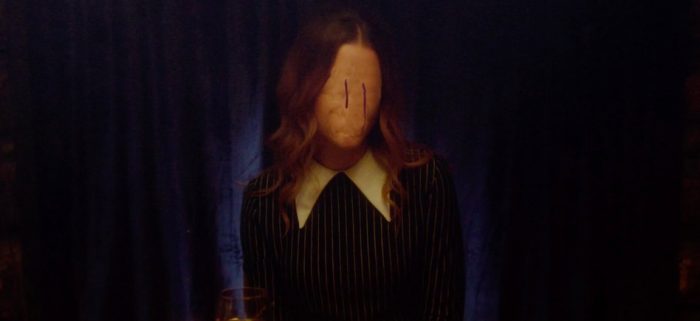
Climate of the Hunter: Alternate Take
Vampires have been done to death, so whenever someone comes along with a fresh and/or unconventional take on bloodsuckers, I perk up. Such is the case with Climate of the Hunter, a surreal little curiosity from filmmaker Mickey Reece. Inspired by 1970s cheapo cinema, Climate of the Hunter is stylish to the extreme, meticulously crafted to blend eras past and present without mockery. It's the type of film with scenes where characters sit down to gross-looking meals, and a sunny narrator tells us what they're about to eat ("Roast chicken with pastry and deviled eggs with shrimp garnish!"). Every meal looks like it was taken from a moldy, water-damaged cookbook published in 1972 and found in a dead man's garage.
Bickering sisters Alma (Ginger Gilmartin) and Elizabeth (Mary Buss) reunite with an old friend, the cultured, pompous Wesley (Ben Hall). Both women clearly had (and have) a crush on the man, and his return into their lives is treated as a cause for celebration. But Alma, a pot-smoking artist with a best bud named BJ Beavers (Jacob Ryan Snovel), begins to suspect that Wesley isn't all he seems. In fact, he might be a vampire. Things are further complicated with Wesley's angry, confrontational son Percy (Sheridan McMichael) shows up.
Climate of the Hunter is so wonderfully strange, full of scenes where characters have dreams in which they stumble into a room and see a bunch of old men playing cards while sporting Dracula capes and greasepaint widow's peaks; where Alma's cone-wearing dog talks; where everyone behaves as if they have no idea how human interactions work.
It doesn't all work. For one thing, the film's pacing is an absolute nightmare (all the stuff with Percy should've been cut from the film entirely to create something smoother). But as awkward as things got, I remained transfixed with Climate of the Hunter. Even when the film lost me (sometimes even due to boredom), it still had me. It's a curious little thing, and I can't in my right mind recommend it to everyone. But there's an audience for this sort of weirdness, and I hope this film finds them. 6.5 out of 10 – Chris Evangelista
Dinner In America Is A Sincerely Punk-Rock Romantic Comedy
Adam Rehmeier's Dinner In America is a dark comedy that's punk at heart, but squishier on the inside than expected. Kyle Gallner stars as an on-the-lam lead singer who unknowingly shacks up with a superfan (Patty, played by Emily Skeggs) until the heat subsides. He's the amateur arsonist who gets off rebelling against society; she's the repressed good-girl whose life has been nothing but structure, helicopter parenting, and timid personality traits.At first, as Simon (Gallner) destroys property and households in his path, Dinner in America is a lot of aggression that blows too much hot air. Americana is defined by turkey dinners with televised football in place of conversations, or high school jocks using homophobic slurs, which I wish wasn't so full-force. Then, once Simon starts focusing his energies (musically and romantically) towards Patty, Rehmeier finds his film's rhythm. They're two opposites, united by an indie band called Psyops, with equal disdain towards meanness and posers.When Dinner In America is trying to force its exaggerated depiction of suburban hellscapes, it can be too much. Luckily, that aggression reduces to allow both Gallner and Skeggs their awkward, rebellious chemistry with an outcast's sincerity. Food plays an exciting role as Simon unexpectedly meets his mosh pit queen (which I expand on in my full review), and we learn to love ourselves through characters who lead by example – or at least like cinematic models we probably shouldn't recreate in real life (but the metaphor is there). - 7 out of 10 - Matt Donato

